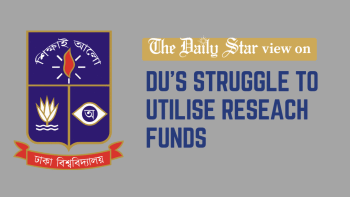Dhaka University’s research predicament

A recent report published in this daily, titled "DU struggles to spend measly research funds," retells the woeful state of research in the country, especially in its century-old, heritage-laden premier academic institution. It also shows how research is viewed at three levels: by university research staff, by the university administration, and by the University Grants Commission (UGC).
At a broad level, the report reflects the lack of conviction about and commitment to research in higher education; it also exposes a disturbing lack of understanding of how to nurture research. For example, Prof Dil Afroza Begum alludes to her knowing that "Dhaka University cannot spend all the allocated funds." Why was the amount allocated then, and what role can the UGC play here to facilitate the conduct of good research?
As a colleague suggested, sprinkling research money among the public universities will not improve their research performance and reputation. It will merely provide an illusion that the UGC is pushing research while encouraging mediocrity. The system must allow for competition between researchers and/or universities.
Also, offering a fixed research budget (Tk 260,000 for arts and humanities and Tk 300,000 for science and technology) by the UGC is a serious problem: grant allocations must be determined by what each research proposal purports to accomplish.
Beyond money, the UGC must also establish a clear vision for research, develop an ambitious research agenda to pursue, and create SMART goals that the universities must realise. Otherwise, the regulatory body will make little headway in providing research leadership.
Perhaps, if the UGC would take the pains to understand how the National Science Foundation or the National Institutes of Health in the US guides the nation's research agenda, or how the National Research Foundation (NRF) in Singapore sets the national direction for R&D, funds strategic initiatives and nurtures research talent, the commission may be able to take a page out of their playbook.
Administration within the university also poses many challenges. Insufficiency of grants allocated to support research is a common refrain. DU Vice-Chancellor Prof Md Akhtaruzzaman indicated, "The allocation for research is too small to do basic research. Our teachers… lose interest due to the small budget." It is widely understood, however, that it's the research idea (proposal) that comes first, not the money: when a university is conducting state-of-the-art research and breaking new ground in various fields, recognised globally, what UGC official would have the temerity to deny research funds? With over a hundred years to claim research prominence, where is the groundbreaking research?
A research university that is unable to spend Tk 10 crore (in 2020-21), roughly equivalent to $1 million, in a single academic year, in a world hungry for research funds (Johns Hopkins had an annual research budget of $3.2 billion in 2021) also speaks to the character and composition of the university and the calibre and motivation of its staff. The dereliction of a fundamental purpose of universities – knowledge creation – is a travesty that, thankfully, is being increasingly questioned today!
Prof Mamtaz Uddin Ahmed observes that researchers and the authorities of the research centres are not serious [about conducting research]. But why are they not serious? Why create research centres then? Has the administration analysed "why" faculty are not interested in research? Faculty opting for research with [larger] NGO funds is a small clue in the larger scheme of things.
Prof ABM Faroque, former faculty member at DU's pharmacy department, has his fingers in the right spot, "It is the failure of the university authorities that they could not use the funds properly." Prof Mohammad Tanzimuddin Khan also states, correctly, that "a research-oriented academic and administrative structure [would] make teachers more dedicated to research." The question that "must" be raised is: "Who is in overall charge of research at Dhaka University? With what competencies? Under what innovative administrative structure?"
The Pennsylvania State University, where I worked for over two decades, has a position of Vice-President of Research responsible for managing university-wide research and pursuing grants from the federal government, industry, as well as private sources. Macquarie University in Australia, similarly, has a Deputy Vice-Chancellor for Research who oversees training and partnerships, research integrity and development, tracking research performance, and facilitating innovation and commercialisation. The people hired for these positions are themselves research-proficient and have a keen understanding of how to guide research.
At the faculty/researcher level, Prof Barua seems to take issue with submitting research proposals. In any decent research system, a proposal is mandatory, which is then peer-reviewed in a competitive environment that includes both public and private universities. But if he is alluding to the inordinate time it takes for the UGC to process the proposals – and many researchers concur – this deficiency must be corrected.
Then there is a group of academics who want all the perks without putting in the hard work. Why else would they "oppose the university's decision, made last year, mandating PhD degrees to get promoted as associate professors and professors?" This reflects an "entitled" mindset among some academics that has consistently worked against building research excellence in the universities. In many research-aspiring countries, these individuals would have been quickly terminated, unless they are demonstrably outstanding teachers committed to teaching tracks.
Failing to spend the "measly amount" of funds since 2018-19 reflects many problems in the university: of having far too many low-calibre research faculty; incompetence in budgeting for research; inability to conceive and drive attractive research agendas; poor research incentives; lack of transparency and accountability; nasty power politics within (and beyond) the institution; and poor leadership at various tiers (from department heads, straight up to the UGC) oblivious of how research systems are evolving in other countries.
A research university that is unable to spend Tk 10 crore (in 2020-21), roughly equivalent to $1 million, in a single academic year, in a world hungry for research funds (Johns Hopkins had an annual research budget of $3.2 billion in 2021) also speaks to the character and composition of the university and the calibre and motivation of its staff. The dereliction of a fundamental purpose of universities – knowledge creation – is a travesty that, thankfully, is being increasingly questioned today!
If the strategic role of research in our universities is to be leveraged, I would urge the academic leadership (broadly defined) to delve into the article "The story of how Singapore became a research nation." Before the year 2000, the article states, research was not very developed in Singapore. Around 2005-06, the deputy prime minister, Dr Tony Tan, created the National Research Foundation. That was the "big bang" in research funding, followed by cathartic changes in personnel (faculty), creating competitive research tracks, and ensuring proper administration of research. Today, Singapore has two top-ranked universities (National University of Singapore and Nanyang Technological University). It also has A*STAR, the Agency for Science, Technology and Research, a top-notch research institute.
I recall proposing a National Research Council (NRC) in the Strategic Plan for Higher Education 2018-2030. As in the US and Singapore, this entity was envisaged to lead national research initiatives tied to national development priorities. Six years have already elapsed with no signs of the NRC.
If research is to be advanced in Bangladesh's higher education system, three immediate system changes are suggested:
- Stop disbursing research funds to the public universities individually. Centralise the funds under an entity like the NRC.
- Make faculty/universities (public and private) compete for grants with proposals being peer-reviewed; grant amounts must be what an approved research requires.
- Designate a "Coordinating Office" at the UGC (or NRC) that will lead the research agenda and be held accountable for advancing research performance in stages.
With knowledge as the new global currency, and with nations even in our region "scrambling to create research universities," lack of understanding of how to nurture research in our universities is not only disquieting, it portends serious difficulties for the growth of the higher education system ever reliant on knowledge produced in other countries. It is time to take the bull by its horns!
Dr Syed Saad Andaleeb is distinguished professor emeritus at Pennsylvania State University in the US, former faculty member of the IBA, Dhaka University, and former vice-chancellor of Brac University.

 For all latest news, follow The Daily Star's Google News channel.
For all latest news, follow The Daily Star's Google News channel. 













Comments